Tigris River at Risk: Pollution Threatens Iraq's Lifeline, Public Health
The visual transformation of the river is already apparent. Once known for its shimmering blue waters, the Tigris has taken on a murky hue, a visible sign of the industrial and medical waste dumped directly into its flow.

By Kamaran Aziz
ERBIL (Kurdistan24) — Iraq's iconic Tigris River, once celebrated for its life-giving waters and cultural significance, is facing an environmental and public health crisis as escalating pollution threatens to transform the historic waterway into a source of disease and death. Environmental experts, medical professionals, and local observers warn that without immediate and decisive intervention, the river could become a major contributor to a rise in cancer and other life-threatening illnesses.
According to environmental expert Omar Abdullatif, the primary culprits behind the Tigris' degradation are unregulated waste disposal from medical facilities and power stations, particularly near the Rashid Military Camp in Baghdad.
Speaking to Kurdistan24, Abdullatif cautioned, "Medical city waste and power stations are observed near Rashid Military Camp, which is the main cause of Tigris water pollution. The responsible authorities need to address this urgently, because if they don't, conversely, in the next five to 10 years, pollution of this river will cause thousands of people to develop cancer."
The visual transformation of the river is already apparent. Once known for its shimmering blue waters, the Tigris has taken on a murky hue, a visible sign of the industrial and medical waste dumped directly into its flow. Experts point to a lack of government regulation and enforcement as key contributors to the crisis.
Sabah Ogaili, an environmental observer, voiced concern over the lack of governmental response, noting, "No real measures have been taken by the government to stop the pollution of the Tigris water. Unfortunately, companies and financial institutions have turned this gift from God into a garbage dump and a place where viruses and diseases accumulate."
The consequences are becoming increasingly dire. Doctors and public health specialists have begun to link the river's pollution to a spike in cancer cases and other chronic illnesses. They warn that the longer the contamination continues, the more likely it is to create a nationwide public health emergency. Iraq already faces rising cancer rates, and the unchecked pollution of one of its primary water sources could accelerate the trend.
The Tigris River, which has nourished Mesopotamian civilizations for millennia, remains a vital resource for millions of Iraqis who depend on it for drinking water, agriculture, and fishing. Its degradation represents not only an environmental disaster but a humanitarian one.
Experts are calling on the Iraqi government, environmental agencies, and international partners to implement immediate cleanup efforts, stricter regulations on industrial and medical waste disposal, and robust monitoring systems to prevent further damage. Without urgent action, the Tigris River could soon become a symbol not of life, but of neglect, disease, and loss.
Kurdistan24's correspondent Seif Ali contributed to this report.